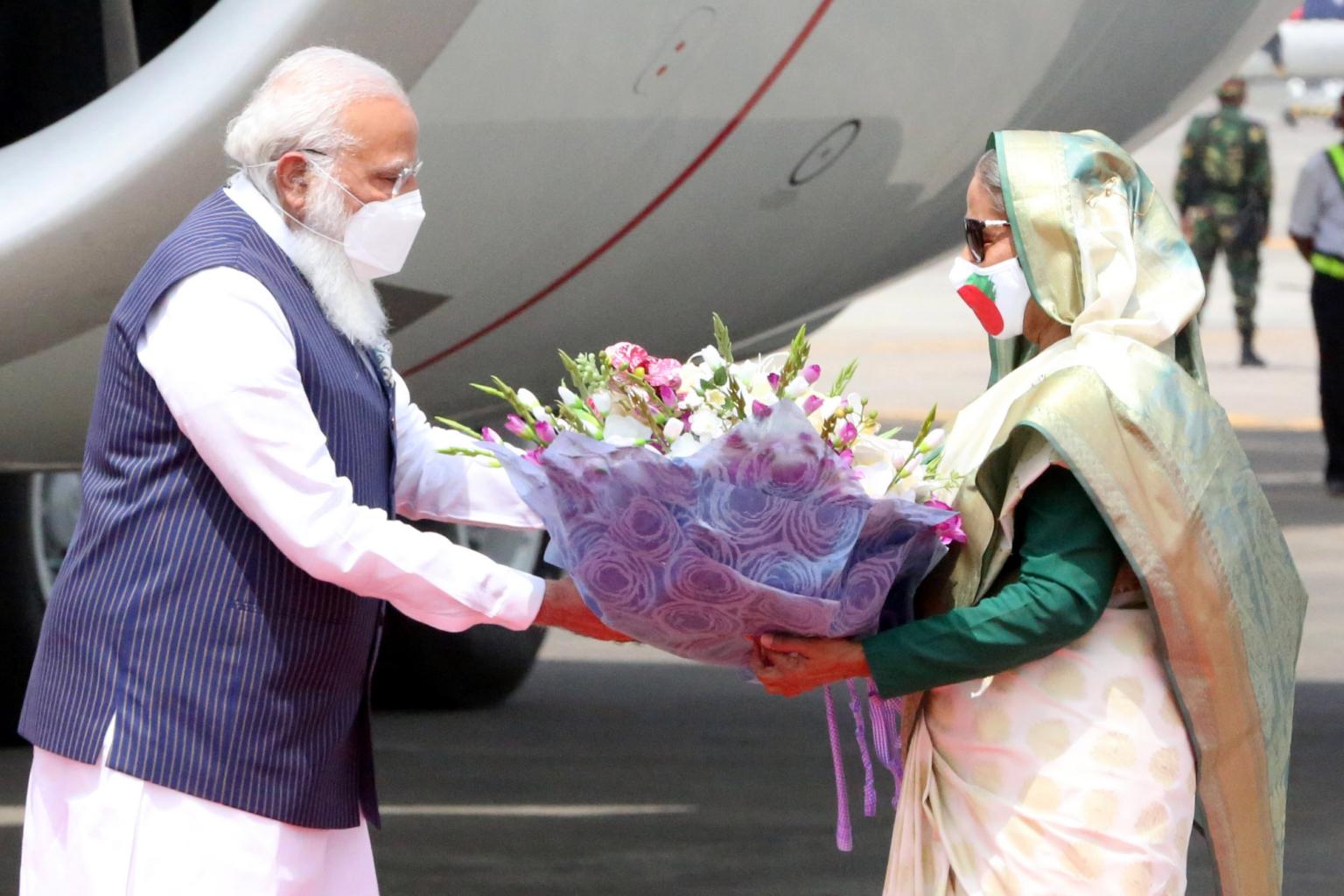Indian PM Modi makes 2-day visit to Bangladesh, first trip abroad since pandemic
Sign up now: Get ST's newsletters delivered to your inbox

Bangladesh's Prime Minister Sheikh Hasina welcomes India's Prime Minister Narendra Modi upon his arrival in Dhaka on March 26, 2021.
PHOTO: EPA-EFE
Follow topic:
NEW DELHI - Prime Minister Narendra Modi arrived in Bangladesh on Friday (March 26), his first overseas trip since the onset of the Covid-19 pandemic, to consolidate a relationship that is among the strongest in the neighbourhood.
Mr Modi's, who is on a two-day visit, will join in celebrations for the 50th anniversary of independence in Bangladesh as well as centenary celebrations of the birth of its founder, Sheikh Mujibur Rehman, whose daughter Sheikh Hasina is the current Prime Minister.
The two countries are also celebrating 50 years of the establishment of diplomatic ties. India was the first country to recognise Bangladesh as an independent nation after its war of liberation from Pakistan in 1971.
Still, Modi's first day of visit saw violence broke out during protests in two places.
At least four people were shot dead and four others injured in the city of Chittagong. Protesters clashed with the police which used tear gas and rubber bullets, according to reports.
The protesters belong to a hardline Islamist group called the Hefazat-e-Islam Bangladesh which is opposed to the visit of Mr Modi. Critics say Mr Modi has been pushing a Hindu-first agenda in India.
In capital in Dhaka, police also fired teargas shells at protesters. Dozens were injured, including two photo-journalists.
Ahead of Mr Modi's visit, the Bangladeshi government had said a "few left-wing and hardline Islamist groups" were against the visit.
Mr Modi said, however, in a statement: "I am happy that my first foreign visit after the onset of the Covid-19 pandemic will be to our friendly neighbouring country, with which India shares deep cultural, linguistic and people-to-people ties."
He is due to hold talks with Ms Hasina on Saturday and visit the mausoleum of her father, who was assassinated in 1975 following a military coup.
Mr Modi said that he would be having "substantive discussions" with his counterpart and that it would be an "occasion to convey appreciation for Bangladesh's remarkable economic and developmental strides" under Ms Hasina.
On Friday, he paid homage to those who died in the 1971 war at the National Martyrs' Memorial.
Indian Foreign Secretary Harsh Vardhan Shringla hailed the visit as a "significant milestone in the bilateral relationship".
Since coming to power in 2009, Ms Hasina proved to be a good friend to New Delhi, curbing violence and terrorism in India's north-east by shutting down insurgent camps in its territory used as a base to launch attacks into India.
She has also given rights of transit to north-eastern Indian states, largely cut off from the mainland and connected only by a thin strip of land known as the chicken's neck.
Still, there have been irritants in ties between the two countries.
Bangladesh has for a long time been seeking to strike a deal on water sharing for the river, Teesta. The agreement was almost clinched several times, but it got entangled in Indian domestic politics, with the state of West Bengal, where the river passes through, refusing to back it.
Another stress point emerged in 2019 when India passed the Citizenship Amendment Act (CAA), which conferred fast track citizenship on non-Muslim illegal immigrants from Pakistan, Bangladesh and Afghanistan. The rhetoric at the time was against illegal migration from Bangladesh into India, with Indian Home Minister Amit Shah calling such migrants "termites".
India has also been wary of the growing influence of China in its neighbourhood, including in Bangladesh.
Most Indian analysts agreed that the visit was to reaffirm ties.
"It is largely to consolidate and assure Bangladesh on the CAA and other issues that have been an irritant in ties. The Teesta, refugee and migration are issues that are very critical," said South Asian expert S.D. Muni
Former diplomat Rajiv Bhatia, who is now a Distinguished Fellow for Foreign Policy Studies at Gateway House, noted that a lot was expected from the visit.
He said this included "major expansion of bilateral cooperation in all relevant fields from investment and energy to connectivity and culture... Bangladesh expects India's full support on river water management and Rohingyas returning to Bangladesh".
Still, there is also a domestic angle to Mr Modi's visit, with the Prime Minister set to visit the Matua community's Shri Shri Harichand Temple in Bangladesh.
The Matua community is also present in large numbers in the state of West Bengal that is going to the polls, which are being conducted in several phases, starting on Saturday.
Mr Modi's Bharatiya Janata Party is locked in a tough battle with the Trinamool Congress led by the state's chief minister Mamata Banerjee.
Matua voters play a significant role in a number of state assembly seats.

